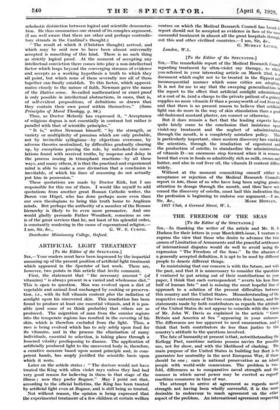ARTIFICIAL LIGHT TREATMENT [To the Editor of the SPECTATOR.]
Sm,—Your readers must have been impressed by the impartial summing up of the present position of artificial light treatment which appeared in the Spectator of last week. There are, however, two points in this article that invite comment.
First, the statement that " the necessary amount " (of vitamins) " is always present in a varied and wholesome diet." This is open to question. Man was evolved upon a diet of vegetable and animal food unchanged by cooking or preserva- tion, i.e., with its full vitamin content plus the radiation of sunlight upon his uncovered skin. This irradiation has been found to produce at least one essential vitamin, and it is pos- sible (and some of us think probable) that others are so produced. The migration of man from the sunnier regions into the temperate regions has resulted in the covering of his skin, which is therefore excluded from the light. Thus, a race is being evolved which has to rely solely upon food for its vitamins, and in the process the elimination of many individuals, essential to selection, is taking place through a lessened vitality predisposing to disease. The application of artificially produced light to the uncovered body is, therefore, a curative measure based upon sound principle and, in com- petent hands, has amply justified the scientific basis upon which it rests.
Later on the article states : " The doctors would not have treated the King with ultra violet rays unless they had had very good reason for believing in them in that stage of the illness ; now they prefer Bognor." May I point out that, according to the official bulletins, the King has been treated by artificial light even at Bognor, and is still being so treated.
Not without reason, the opinion is being expressed that the experimental treatment of a few children at certain welfare
centres on which the Medical Research Council has based it report should not be accepted as evidence in face of the mon successful treatment in almost all the great hospitals through out this and other civilized countries.—I am, 'Sir, &c.,
London, W.1.
G. MURRAY LEVICE.






































 Previous page
Previous page